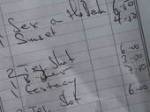I’m considering penning a memoir. I’m serious.
I’m sure there’s a finer art to it than what I’m putting to paper. No, I know there is as evidenced by PaperGirlMemoir’s blog. I enjoy her blog, among several others, those detailing their writing journeys. I suppose she’s serving as a “model,” though she has a much better, cleaner handle on how to go about writing one than I do. I tend to ramble. (I’m pretending it’s my style, so don’t say anything).

Sometimes, it reads like this, but it doesn't feel like it.
At first, I thought, why on earth would I think anyone wants to read a memoir by me. And then, I thought, why not? Words don’t exist just for those with accomplished lives. Nor do they wait for sentences that only come from the pens of established literati. I have lived, and that is miracle enough.
If we take Jung at his word, and dip our own toes in the “collective unconscious,” then surely there is no life unworthy of being written about.
Besides, what you say isn’t the point, is it? The challenge comes in how you say it.
I’ve been stressing and stressing this to my students, this first summer term: that their opinions are of merit, that they really already know most of this critical theory “stuff,” (we do it daily in our normal lives) they’ve just never had to give it a name, before. The higher hill to climb for them is in learning just that: how to justify their opinions. Most of them immediately jump to Reader-Response criticism, overlooking the necessity of understanding the purpose of becoming an “informed reader” within an “interpretive community.”
But, twisting that critical concept, a bit, I suppose, that’s what I’m trying to do, too: justify my opinions (except in this case, they all total up to My Life)…but, I mean, that’s one way of looking at a memoir, or the impetus behind writing one, right? It’s the ability to interpret your community.
I’ve been irregularly writing a memoir, or two, for the last couple of years. I never put a great deal of steady stock in it, but the idea, I find intoxicating. One day, maybe, I’ll put all these random pages together. But, in the meantime, I thought I might share a couple with you. I’ve put, perhaps, a total of 60 pages into two different collections; the reason for that is they come from two very different stylistic approaches: singular personal (mostly me with opinions) and plural personal (mostly me + others + opinions). The titles I’ve given them are Loud Enough and Deer in the Road. I’m writing the titles here for posterity’s sake.
I got first dibs, in other words. (I worked really hard on coming up with them, too).
…from Loud Enough
Maybe this is a work of fiction. There’d be a certain irony in that, if it were. Maybe this is an autobiography; there’s a good deal of personal experience and truth to the subject matter. Or, maybe it doesn’t matter. I’m probably only vaguely aware of what I’m saying. But first things first, of course.
I’d been obsessing over a book, a memoir, for a long time because I thought I was interesting; I’d conquered (and that’s a term I’m using loosely) prose and poetry and playwriting. Granted, these conquests occurred mainly in the privacy of my room, and the only witness was my cat, Aristophanes.
Still, she was nonetheless proud and a harsh critic.
But you know, I almost didn’t get this far. I was almost too afraid of having to be responsible for words. I’ve also been obsessed with that concept, with language in general. For instance, I don’t own any of these words, and yet, by putting them into these sentences I’m basically contracting myself to their overall impression, their intent.
There are few words more disappointing, more potentially upsetting in the whole English language than intent. It’s a frightening responsibility, too, to commit to something as determined as intent […]
I was haphazardly cast as The Tutor in Sartre’s The Flies, one February, early in the month, years ago. I use haphazard because, to be honest, I didn’t want to be in the play. I’d grown very upset with acting and tired and weary. After all, I’d just turned 27. I was already washed up, I felt. I’d done nothing with my life, in theatre, at that point, of any real significance and I’d had such plans. God, did I have plans. All my friends were doing their, you know, plans, but not I.
Even a picture of flies is aggravating.
I fell in love.
That’s not so necessary for this book, though.
At least not for this part.
I still had my professional experiences. I still worked with good people who had a lot of knowledge about their place in the world of theatre and masks.
A large criticism in my past has been my reluctance to commit; perhaps, I should use the colloquial term here for easy reference: I was lazy. But, now wait. I had a good reason to be. My procrastination came from an abundance of directions. I was consumed with ideas for plays, for scenes, as an actor, as a singer, cabaret artist, and in character analysis, for design and costume, and so on and on and on.
I couldn’t stop thinking about the possibilities, and when you’re faced with an endless array of potential, no matter which way you turn…what do you do? I slept, usually. My potential was deeply rooted in depression, a rhetorically habitual Remembrance of Things Past (I really should have read more Proust in life), a negligence of what was right in front of my face – I was nearly my own demise.
Surely, you know that feeling.
Now, of course, I should explain about Sartre. He’s really the reason I’m at this point, and really, in all honesty, why the hell should you care if I don’t at least explain the basis of this bizarre ramble…because of all the things I’m kinda OK at, rambling is not one of them – I’m more than OK at it; I am a Master of rambling.
And, besides, you have no idea who I am. But, you will. You’ll care, because despite the idiosyncracies that are me, despite how different I might seem, I represent you, in a way. I had a story I wanted to tell, and now I’m telling it. I just decided, Enough! It’s self-pity or self-preservation. I suppose, though, you’ll decide that later, after reading this. Still, that sort of passion in life is sorely overlooked, I think.
Don’t you?
As I said, I was The Tutor. I had been unwilling to accept the role, even though I was asked three times to take it; the director, bless her beautiful heart, had offered it to me originally but I was suffering from a severe nonchalance of the stage. I’d spent, a few months earlier, over 350 rehearsal hours, every day of the week, on a somewhat shoddily written, original musical (though two of the songs were digestible), with a director incapable of producing a random scribble from a pencil, much less a vision for the piece (which was in and of itself a powerful story), and this, all from a nonprofit theatre organization with really good intentions (i.e., we all had day jobs, other contracts, etc.). It was a painful process and nearly destroyed my faith in theatre. That’s the part that would be severe.
So, I wasn’t terribly excited or looking forward to another venture on stage. Especially, Sartre’s The Flies, in which, I almost had to perform barefoot…which I never do. Ever. It was quite a struggle: me and the costumer.
You should know, first off, that The Flies is an excruciatingly lengthy production, and not one of his best. Or perhaps that was only the case for ours? Most of our leads were magnificent, I must say, (though we did have a weak Orestes), and personally, I loved the material. It was, perhaps, my reticence that kept me; I also got in trouble for sneaking out, in costume, during Act One, third night of the run, and buying a bottle of champagne. I also got gas; I was on empty. (For shame!) But, The Tutor doesn’t come back on, after Act One, for a very long time. (Kris, Kris, Kris).
The play was still a poignant piece, and well-attended. But, I took the role out of pity, a major offense in the craft of acting.
No caption necessary.
That didn’t change much throughout the course of the run, either. I carried my plastic cup of pathos everywhere I went.
However, despite my best efforts at being indifferent and “put-upon,” Sartre got to me with one line. One line that would not escape me. One single line that made the entire show “worth it.”
[…]
There’s a moment in the opening of the play in which Orestes, the rightful heir to the throne of Argos (though I can’t see for the life of me why he’d want it) turns to The Tutor who had begun to politely berate him, if you will, about his aloofness to his upbringing and of course Orestes, being displaced royalty and spoiled, immediately starts in with “I know how lucky I am, but all the same, yadda yadda yadda…”Kids.
But then, in one of his diatribes to The Tutor, he actually turns the tables. It’s very slight, very subtle. He’s in the middle of another “yadda yadda yadda” spiel when he suddenly (this is Sartre, so the use of the word suddenly is generous) accuses The Tutor of having no “joy in going somewhere definite.”
And all of a sudden, just like that, I was not The Tutor anymore.
I was a 27-year-old man on a plain stage in Bloomington, Indiana, and I was…well, I was exactly what Orestes said, a man who had no joy, not going anywhere definite, not really going anywhere at all.
Anymore.
And I wanted to know what happened to that curly-headed kid in glasses from Mississippi who had all his life been lauded as the next great piece of poetry in motion. When did he slow down? And why?
So, here I am, writing a book about my life as if I’m great, one painful, pulled minute after another. As if I’m worth it.
And you want to know why? You want to hear the truth? It’s because I’ve never believed I wasn’t. And that’s why I’m not afraid to write. This or anything else.
More to come…?
God, I hope so…(though it is a tad boring. But, I’m working on that, sorry).






